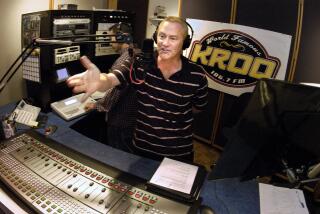FCC Formulates Rule on Hoaxes : Radio: The agency will decide soon on whether to punish KROQ-FM for airing a phony murder confession. Meantime, it’s preparing for comment on a new guideline.
- Share via
The Federal Communications Commission will rule soon on whether to punish KROQ-FM (106.7) for the phony murder confession it broadcast last year. But the regulatory agency isn’t waiting to try to formulate an anti-hoax rule to ward against future such incidents.
The FCC expects to begin soliciting public comment next week on a proposal to establish a set of clear-cut rules to serve as guidelines for future actions against stations and individuals who pull off hoaxes.
“It’s because we’ve had situations like KROQ and others that this whole issue has come before the commission,” said Bill Johnson, deputy chief of the FCC’s mass media bureau.
The KROQ hoax--in which morning deejays Kevin Ryder and Gene (Bean) Baxter concocted a fake murder confession that kicked off an elaborate investigation by the Los Angeles County Sheriff’s Department--is still pending at the commission. A ruling is expected to be handed down “any day now,” Johnson said.
Under present regulations, the FCC--which receives about a dozen reports a year of radio hoaxes around the country--has limited options for punishment. Unless other federal regulations are violated that carry monetary fines, the commission essentially is limited in dealing with hoaxes to either issuing an admonition or revoking a station’s license. Commission members are seeking to include some middle-ground penalties for a hoax, such as fines.
The commission has suggested that a hoax rule include three basic elements: that the broadcaster knows the information broadcast is false; that the broadcast of the information directly causes public harm, and that the harm was foreseeable.
Those who want to comment on the proposal are being asked to address whether it is sufficiently inclusive and whether it would infringe on broadcasters’ First Amendment rights.
Commissioner James H. Quello issued a statement saying that though he believes the public interest is not served by a broadcast that only scares or alarms the audience “for the mere thrill of it,” he is concerned with protecting freedom of speech.
“It may be difficult to craft a rule that can encompass real abuses without stifling creative programming,” Quello said. “We therefore must take care that any rule on hoaxes not prevent the broadcast of events such as Orson Welles’ ‘War of the Worlds,’ which is widely recognized as a classic of American radio.”
In the KROQ incident, which occured in June, 1990, deejay Doug Roberts--who then was working elsewhere but now is employed at the rock station--called the morning team of Ryder and Baxter pretending to confess to beating his girlfriend to death. The bogus confession led to a 10-month search for the killer by sheriffs’ detectives and elicited about 400 “leads” when broadcast on the “Unsolved Mysteries” television show.
Acting on an anonymous tip, a sheriff’s detective eventually determined that Ryder and Baxter had engineered the event and then perpetuated the hoax in interviews with the news media.
When the scam was disclosed last April, the three deejays went on the air and apologized, as did station general manager Trip Reeb. The deejays were suspended for five days without pay and were ordered by Infinity Broadcasting Corp., which owns KROQ, to reimburse the Sheriff’s Department for the $12,170 spent on the murder investigation and to perform 149 hours of community service.
FCC attorneys conducted a formal administrative hearing in Los Angeles in late July similar to a grand jury proceeding, during which they questioned under oath a dozen KROQ employees, including Baxter, Ryder, Roberts and Reeb.
The staff recommendation is currently being reviewed by the five FCC commissioners, who will make the final decision on what action, if any, to take.
More to Read
Sign up for Essential California
The most important California stories and recommendations in your inbox every morning.
You may occasionally receive promotional content from the Los Angeles Times.












